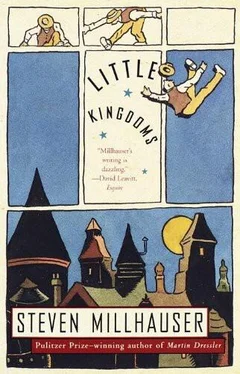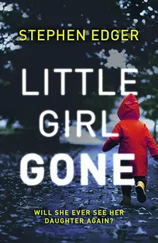Max received his refusal wryly, as if he had thrown a drowning man a rope that the poor devil refused to take because it felt a little rough to the touch, and Franklin bent to the task of seeing exactly how things stood with him. Kroll had canceled “Dime Museum Days,” which had long ago played itself out and was dragging a shadowy half-life through the dailies for no conceivable reason. He had assigned “Subway Sammy” to another artist, and he had asked Franklin to revive one of his old Cincinnati strips, about a likable hobo whose dreams were continually shattered by reality but who kept on dreaming anyway. But Franklin’s real task was to supply Kroll with editorial cartoons — not only for Kroll’s daily column but for other news articles as well. Franklin threw himself into the task, intent on making amends for his halfhearted work in the past; and as the days flowed by, and his editorial cartoons grew more accomplished, he found a kind of contentment in his work, marred only by sudden sharp bursts of irritation or restlessness.
Two weeks after his refusal of Max’s offer, Franklin received in his office mail a three-color circular announcing the birth of Maxograms, Inc., and including a scribbled line from Max: “Think it over. It’s never too late.” The next day Max called to say that the whole staff had gone with him, leaving Vivograph on the brink of collapse. Since Vivograph was under contract to supply their popular cartoon series to Cinemart, Max had been forced to abandon the series, which he himself had mostly created. But he had signed a fat two-year contract with Cinemart for a spectacular new series, which would make the rival studio look like a bunch of bush leaguers. Meanwhile Vivograph had refused to go under and had hired a whole new staff to churn out the old stuff. But since the copyrights to all the cartoons were held not by the studio but by the distributor, Cinemart was under no obligation to renew the contract with Vivograph, and had given Max to understand that the old series would revert to Maxograms when the contract with Vivograph expired. Cinemart had insisted on holding onto Toys at Midnight , which was still attracting bookings, but Max had worked out a deal that gave Maxograms the option of purchasing the distribution rights twelve months down the road. All this was part of a larger plan to combine production and distribution and leave the other studios choking in his dust. In the meantime Max wanted Franklin to know he had faith in his work. He hoped Franklin would rethink his offer and keep Maxograms in mind when it came time for the next cartoon. Franklin said he was miles away from even thinking about a cartoon. “That’s okay,” Max said quickly. When Max hung up, Franklin had the sensation that Max had been talking to someone else, whom Franklin had been impersonating for obscure reasons.
Again he avoided his tower study, which seemed the haunt of a mad scientist with a foaming beaker; again he sank into family life as into his soft armchair. The sharp sense he sometimes had of falling into a pattern was blunted by the equally sharp sense of a difference, for if Cora was present at these family occasions she was also somehow absent. Often she complained of headaches and went to bed early, leaving Franklin to put Stella to bed. One evening she sat down at the piano and played a few bars, but suddenly stood up, raising a hand to her temple and shutting her eyes. She refused to see Dr. Shawcross; and once, trying to raise a window in the parlor, she kept banging her palms against the upper rail, over and over again, while a muscle worked in her cheek and the hair on her forehead grew damp.
He was often alone with Stella. In the evenings, after dinner, she seemed content to sprawl in a lamplit corner of the sofa reading Anne of Avonlea , or to sit at her old worktable cutting out paper costumes that she designed herself and fitted to her paper dolls. Franklin drew a series of hats for her: a dashing cloche to go with her flapper’s dress, a broad-brimmed straw hat with fruit and flowers, a checkered beret, a cowgirl’s hat with a picture of a steer on it. Max, obsessed with his new studio, was rarely visible on weekends; and while Cora went on errands or sat practicing scales to the click of a metronome, that eerie clock without a face, Franklin and Stella took long walks on autumn trails or went rowing on the river.
At the office he was spending more and more time on editorial cartoons, fussing over details, making small adjustments, adding minute refinements; and holding out a sketch at arm’s length he would examine it carefully, searching for defects of composition.
One darkening autumn day when Franklin drove home from the station he walked up the porch steps and saw through the window Stella reading Chronicles of Avonlea on the lamplit sofa. In the front hall he hung his hat on the coatrack and was about to call out to her through the partly open parlor door when he noticed a pale blue envelope on the hall table. It was Cora’s stationery. On it she had printed his first name. Franklin opened the envelope, unfolded the pale blue piece of paper, and read: “Dear Franklin, I can no longer live a lie. Max and I”—he crumpled the letter, thrust it into his jacket pocket, hung up his coat, took out the letter and scanned it wildly, then thrust it into his pocket again and walked into the parlor. “Dad’s home. Did you have a good day at school? Your mother won’t be having dinner with us tonight, something came up — did she say anything about the lamb chops?” In the kitchen he uncrumpled the letter and tried to read it through, but his brain was pounding, something was wrong with his vision, the words kept splitting apart and falling into fragments—“six mon,” “unf,” “tter for ev,” “nbear”—and later that night, after he had put Stella to bed early and, evading her sharp gaze, explained that Mom was visiting friends far away and might not be back for a day or two, he went down to the parlor and unfolded the letter, but the words were crisscrossed by hundreds of little creases and kept falling into cracks, abysses.
He turned off the lamp and sat in the dark, staring through the windows at the night and waiting for Cora. His temples throbbed, his stomach trembled and rippled, his eyelids felt burning hot. At two o’clock in the morning he heard a car approaching on the road below. He felt his mouth open, as if to emit a cry, but the car slowly passed. Toward three he heard footsteps on the stairs, and suddenly he realized it was all a hideous joke, Cora had been punishing him, he would forgive her despite her cruelty, and when the parlor door opened he saw Stella staring at him gravely, her eyes heavy with sleep and her hair wild. Without a word she sat down next to him and fell asleep against his arm. In the morning he made her breakfast and drove her to school. All day he sat in the parlor, closing his eyes from time to time but not sleeping. Stella came up the walk at four, and that night after he had put her to bed he climbed the stairs to his tower study. In the dark room he stood to the left of the right-hand window It was a clear night, and he could see far up the river. Max’s toy house was well lit. Through the dark pines the yellow lights seemed to tremble like candleflames and on the black river they lay in wavering lines.
He became aware of the glass-cased clock on his desk. The pendulum, immobile, hung down heavily over the slumbering key. And an irritation came over him: it was not right; someone should have wound the clock. In a burst of anger he opened the glass door, seized the clumsy key, and wound the clock tightly. Then he took out his pocket watch and set the clock hands to the precise hour. He pushed the pendulum to one side, releasing it into its arc. The clock ticked. His father had once shown him what made a clock tick: it was the sound of a toothed wheel escaping from first one and then another little hook. The sound of time was the sound of a continual effort to escape from something that held you back. He replaced the key on the mirrory floor beneath the pendulum and the exposed gears and closed the glass door. The clock ticked, the pendulum swung back and forth. And he felt soothed, soothed deep in his bones, as the clock ticked and the pendulum swung back and forth. Slowly the pendulum swung back and forth. The clock ticked.
Читать дальше












